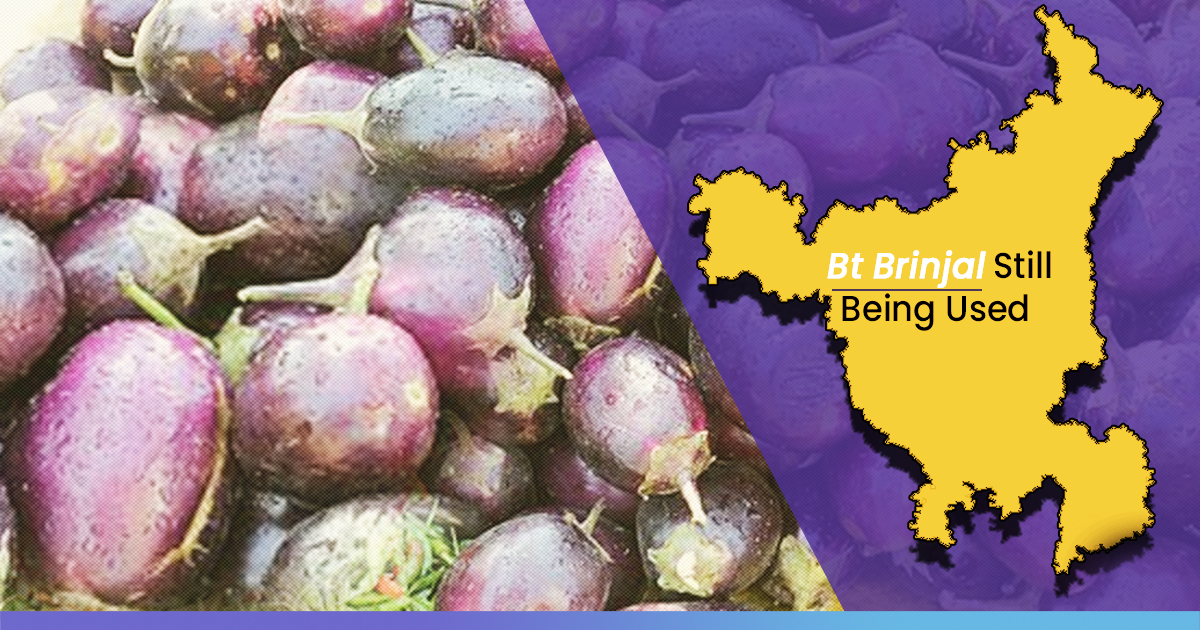Days after two laboratories confirmed the cultivation of illegal Bt brinjal in Haryana, DS Dhesi, Chairman of the State Biotechnology Coordination Committee, on Tuesday announced that a committee has been formed to look into harmful aspects of consuming brinjal. The committee will provide its report in three days, Dhesi said.
Stating that there is no independent evaluation on how safe Bt brinjal is as all the data was provided only by the developer of the seed, Rajinder Chaudhary, Activist, told The Logical Indian, “How will a committee determine the safety of seed in three days, when there is no independent data about the side-effects of the seed, as mentioned in the 2010 order.”
Earlier on Sunday, Advocate Prashant Bhushan has sent a legal notice to Union Minister of Environment and Forests Harsh Vardhan. Bhushan, in the notice, alleged that ministry’s 2010 order banning the use of Bt brinjal is being violated. Bhushan has called for an immediate ban on the environmental release of any genetically modified organism, except for Bt cotton, reported Scroll.in.
Rajinder feared that like Bt cotton, Bt brinjal may also find its way to cultivation if urgent action is not taken by the government, “Bt cotton is the only GM crop that has been permitted and that too was approved after mass illegal cultivation was found across India, initially, it was cultivated illegally like the Brinjal is being cultivated.”
“Both the central government as well as the state govt are not acting with the urgency that is expected from them. It is a health concern, and also an issue of preserving our biodiversity,” said Rajinder.
Cultivation of Bt brinjal not limited to Haryana
Following the lab report, a group of agricultural activists on Saturday urged union ministry to investigate farming of Bt brinjal across India as they suspected that the cultivation of genetically modified brinjal may not be limited to Haryana.
“We demand that the environment ministry now writes to all state governments, asking them to take up time-bound investigations on brinjal cultivation in their respective states and ascertain if illegal Bt Brinjal cultivation is taking place,” said farm activist Kavitha Kuruganti of the Coalition for a GM-free India to The Times of India.
The violation of 2010 order is “the most serious breach of India’s biosafety, brinjal biodiversity and therefore, bio-security,” said Aruna Rodrigues environmentalist and the lead petitioner in public interest litigation filed in the Supreme Court against genetically modified crops, to Scroll.in.
“India has the greatest brinjal germplasm in the world with 2,500 varieties including wild species, which are now under threat of irreversible contamination because of cumulative acts over time of senseless and criminally irresponsible regulatory oversight,” she said.
Blaming government agencies for illegal cultivation of Bt brinjal, Kapil Shah, an anti-GM activist from Gujarat said, “This is clearly a failure of the government agencies concerned that illegal Bt brinjal is being cultivated in the country…,” reported Business Line.
Bt brinjal ban
Following intense opposition from several states and farm activists, Environment Minister Jairam Ramesh announced an indefinite ban on the release of Bt brinjal in 2010. However, the ban was only confined to the use of Bt brinjal seeds and did not cover the use of genetically modified technology to improve crop yields.
Genetically modified seeds of Bt brinjal are prepared with Cry1Ac gene from a bacterium Bacillus thuringiensis (Bt) so that the plant grows resistant to certain pests including the fruit and shoot borers. Thus the backers argued that the introduction of Bt brinjal would cut crop losses due to insect damage by more than half and drastically reduce pesticide use, reported The Guardian.
On the other side, farm activists and environmentalists across India argued that if Bt brinjal was introduced, it would be detrimental to the cultivation of 2000-odd varieties of aubergines, which has been cultivated in India for centuries.
Also Read: Meet The Man Who Has Been Growing Exotic Varieties of Vegetables To Maintain Biodiversity











